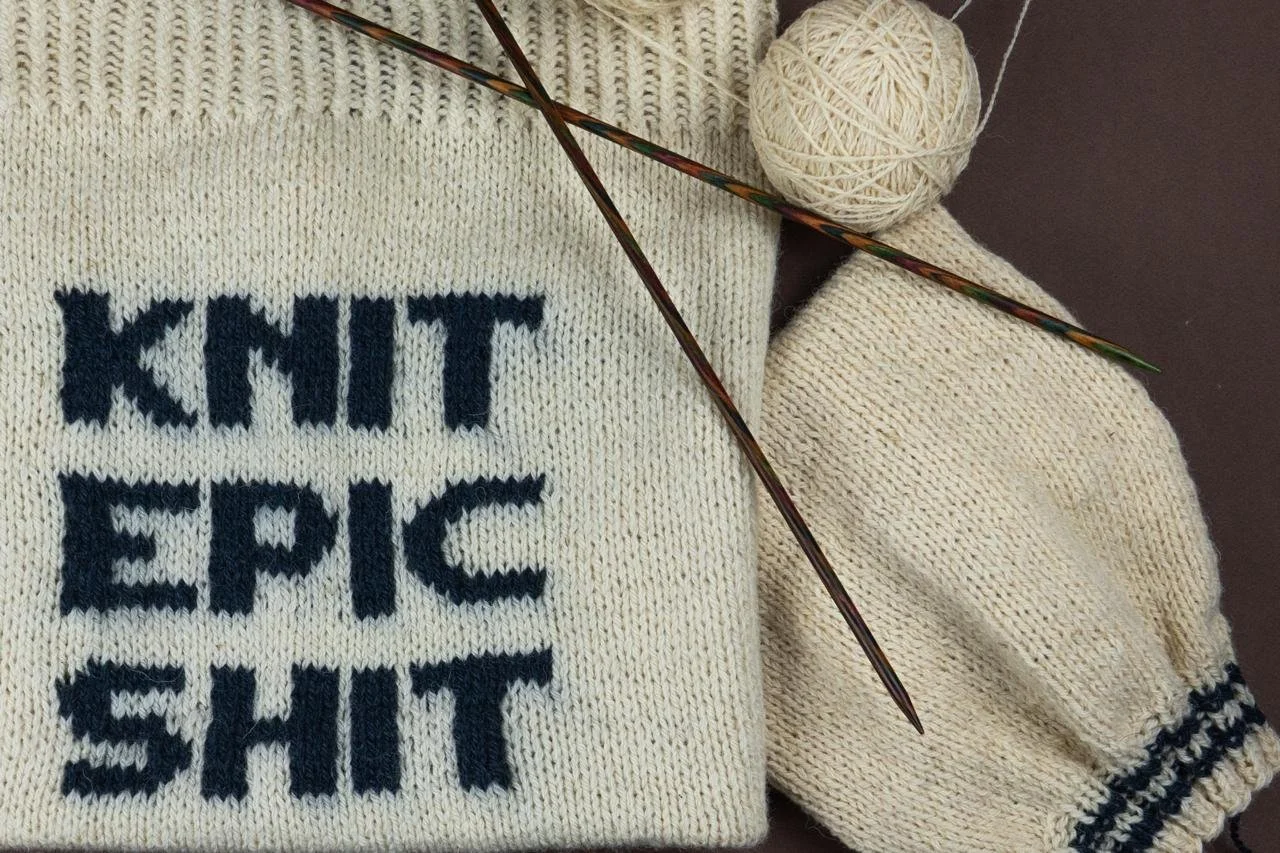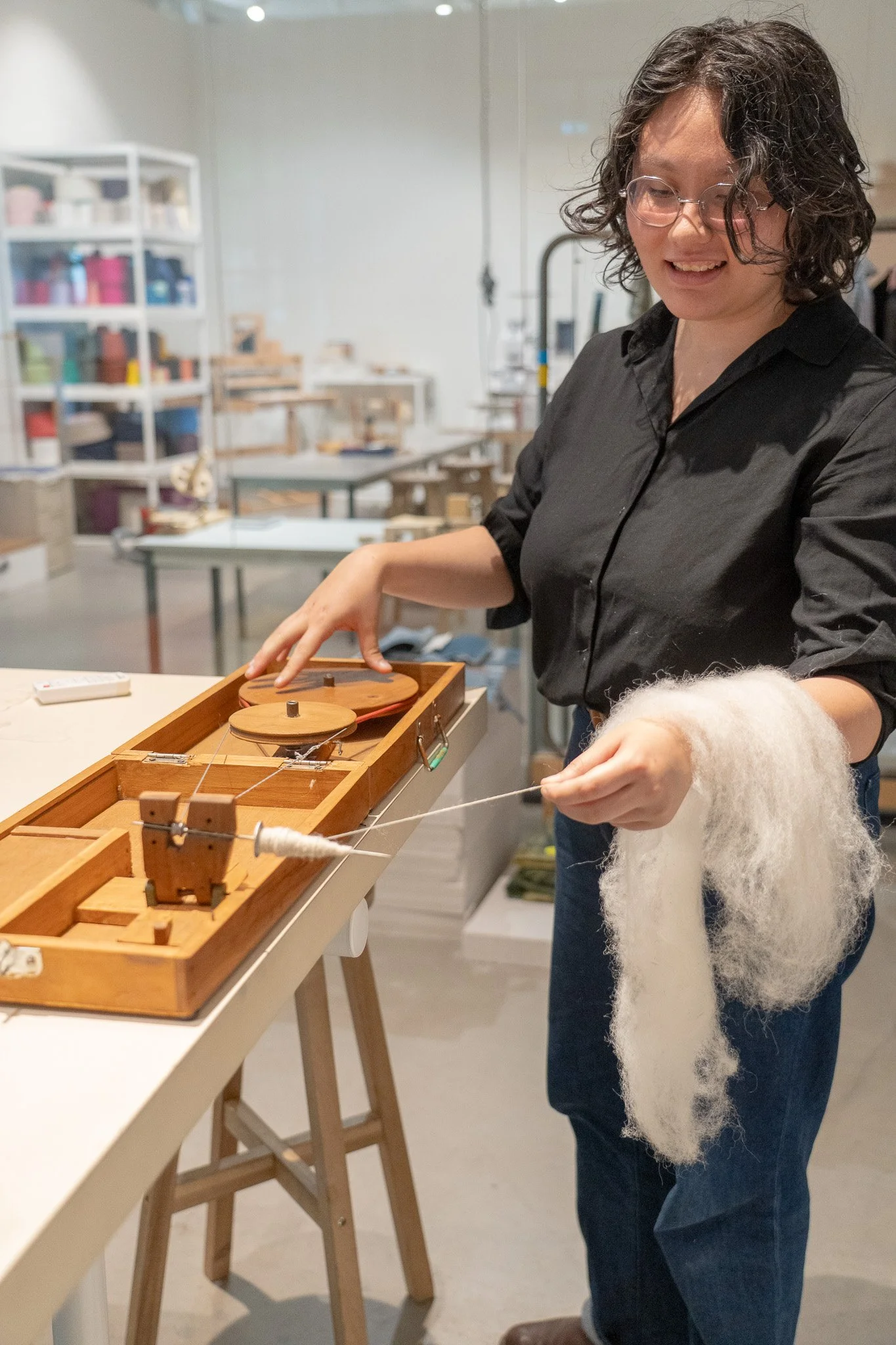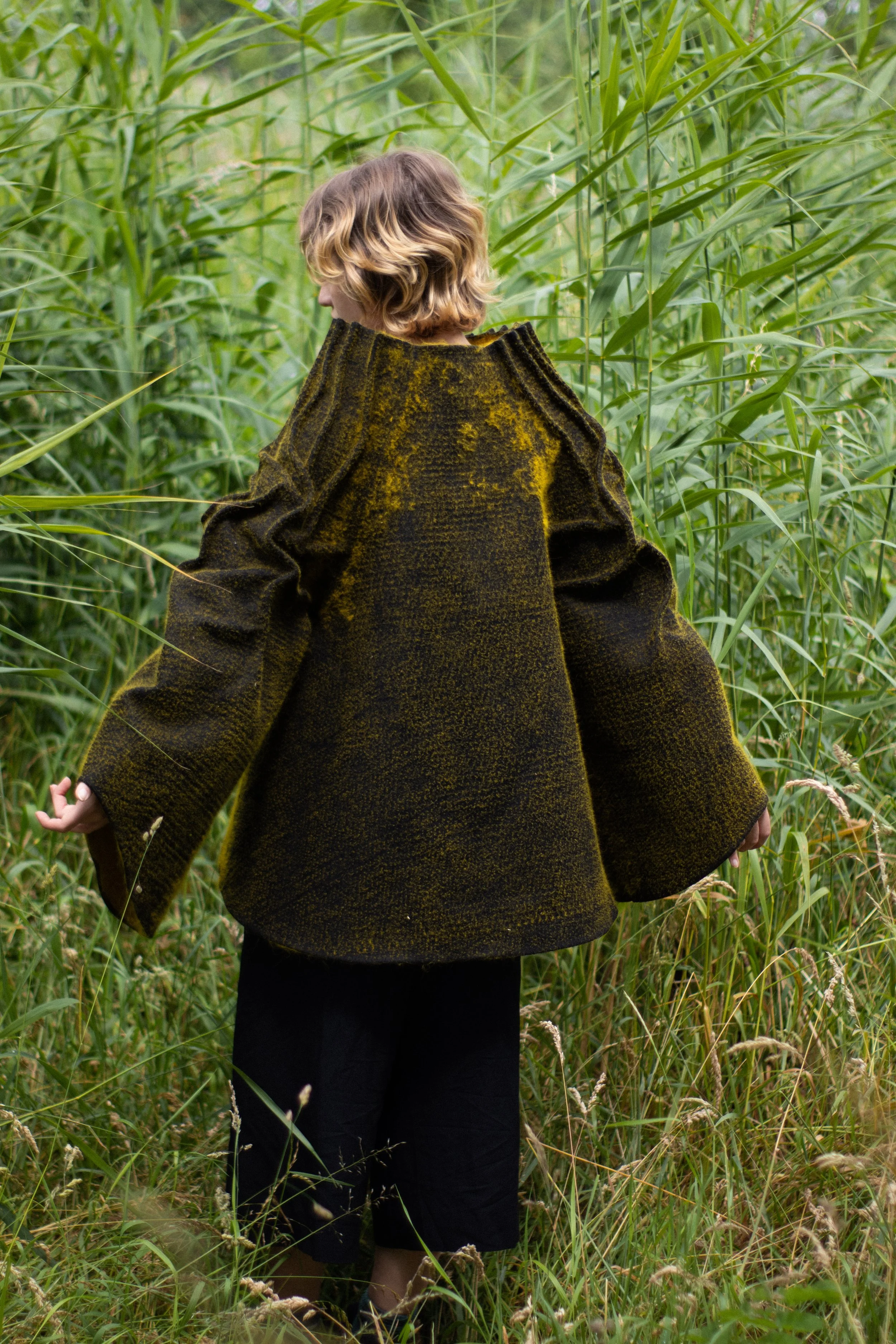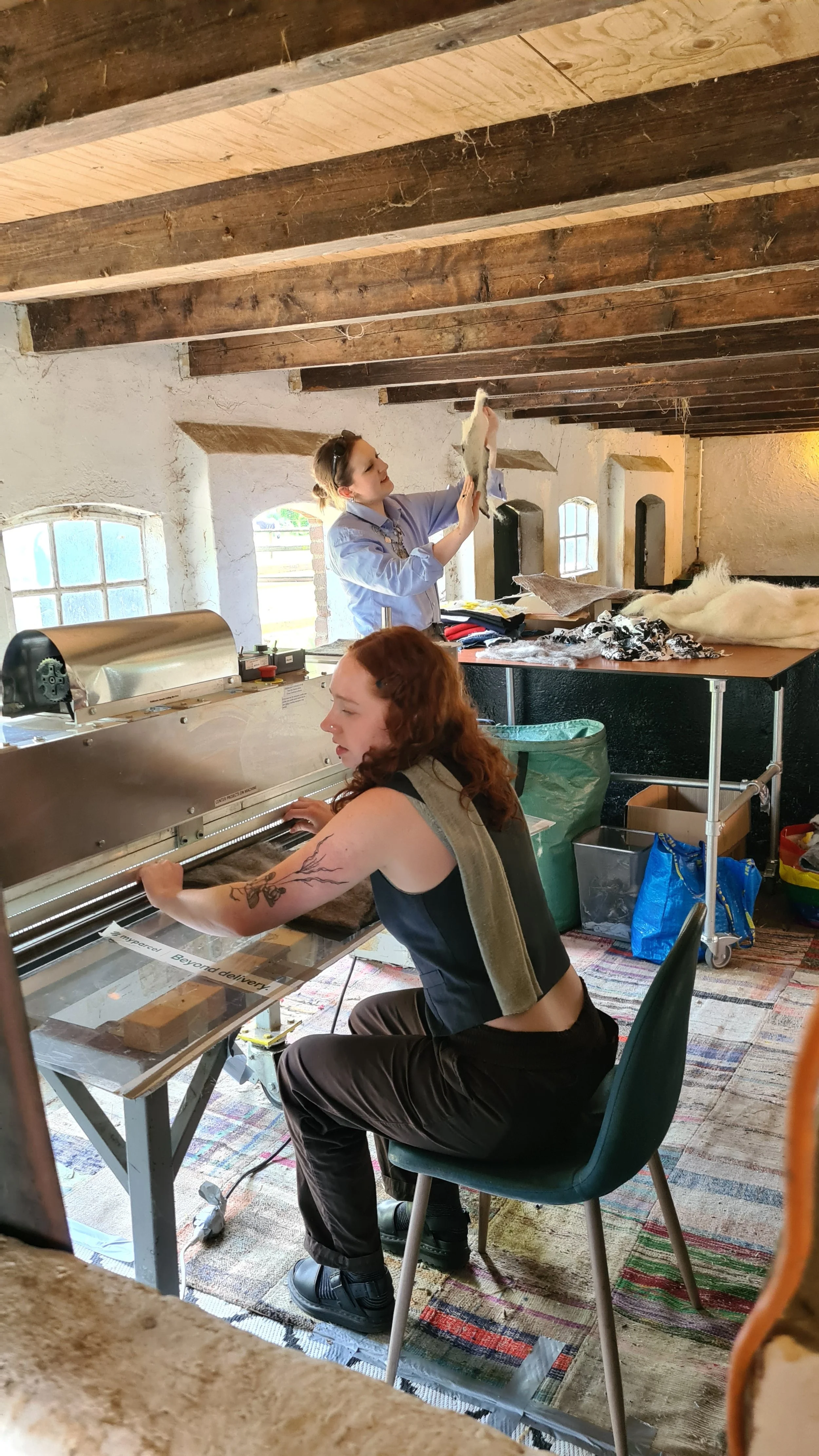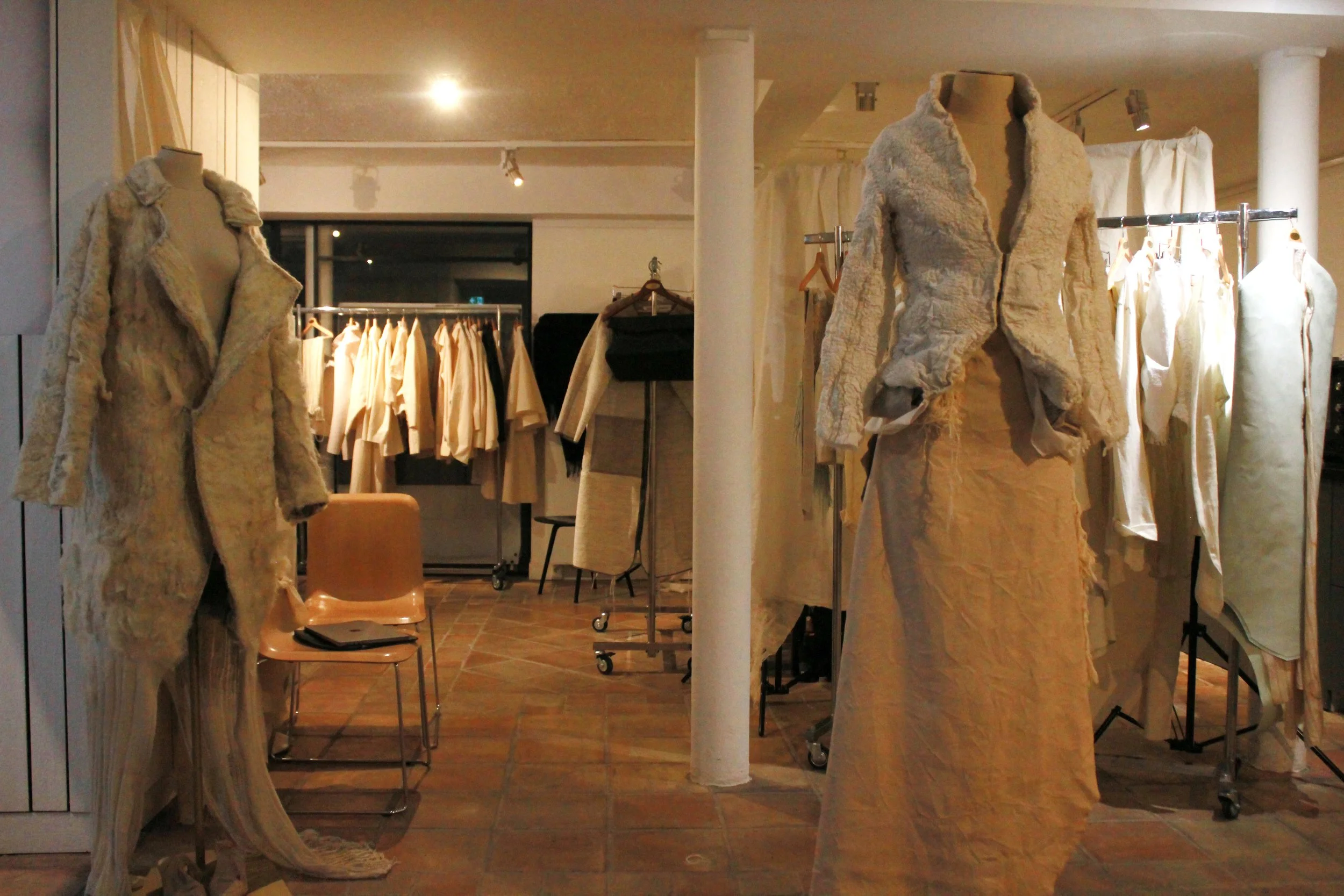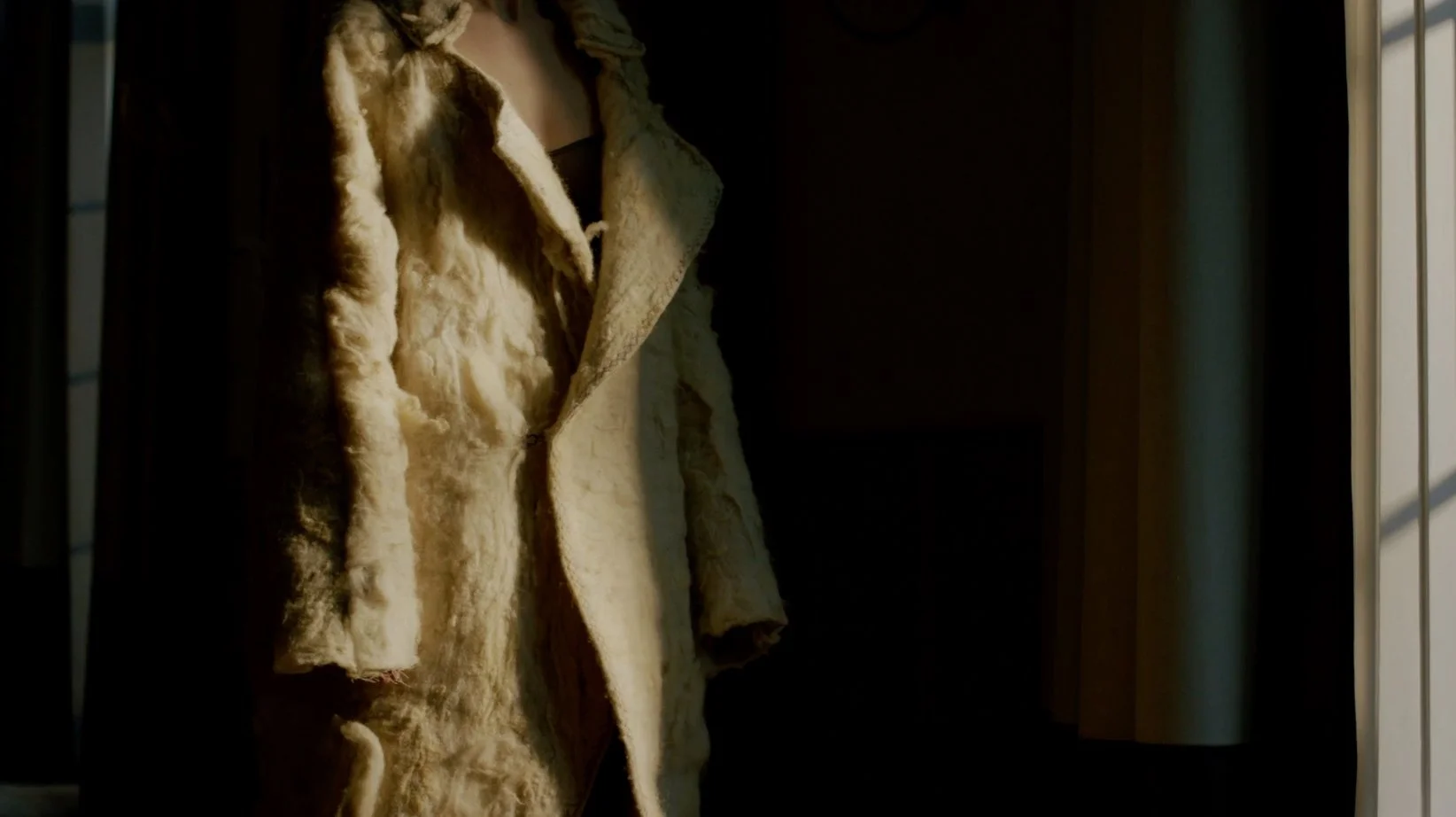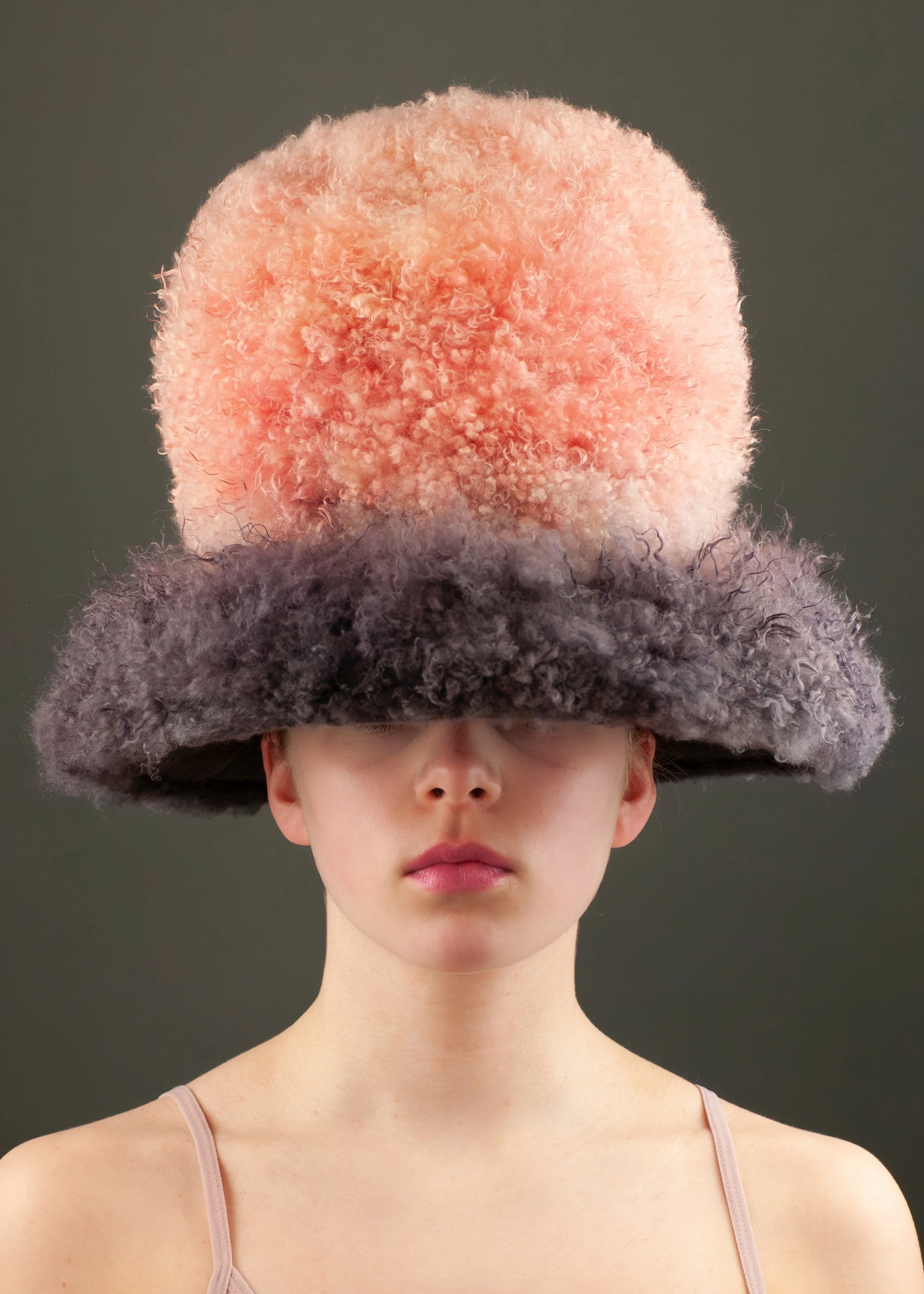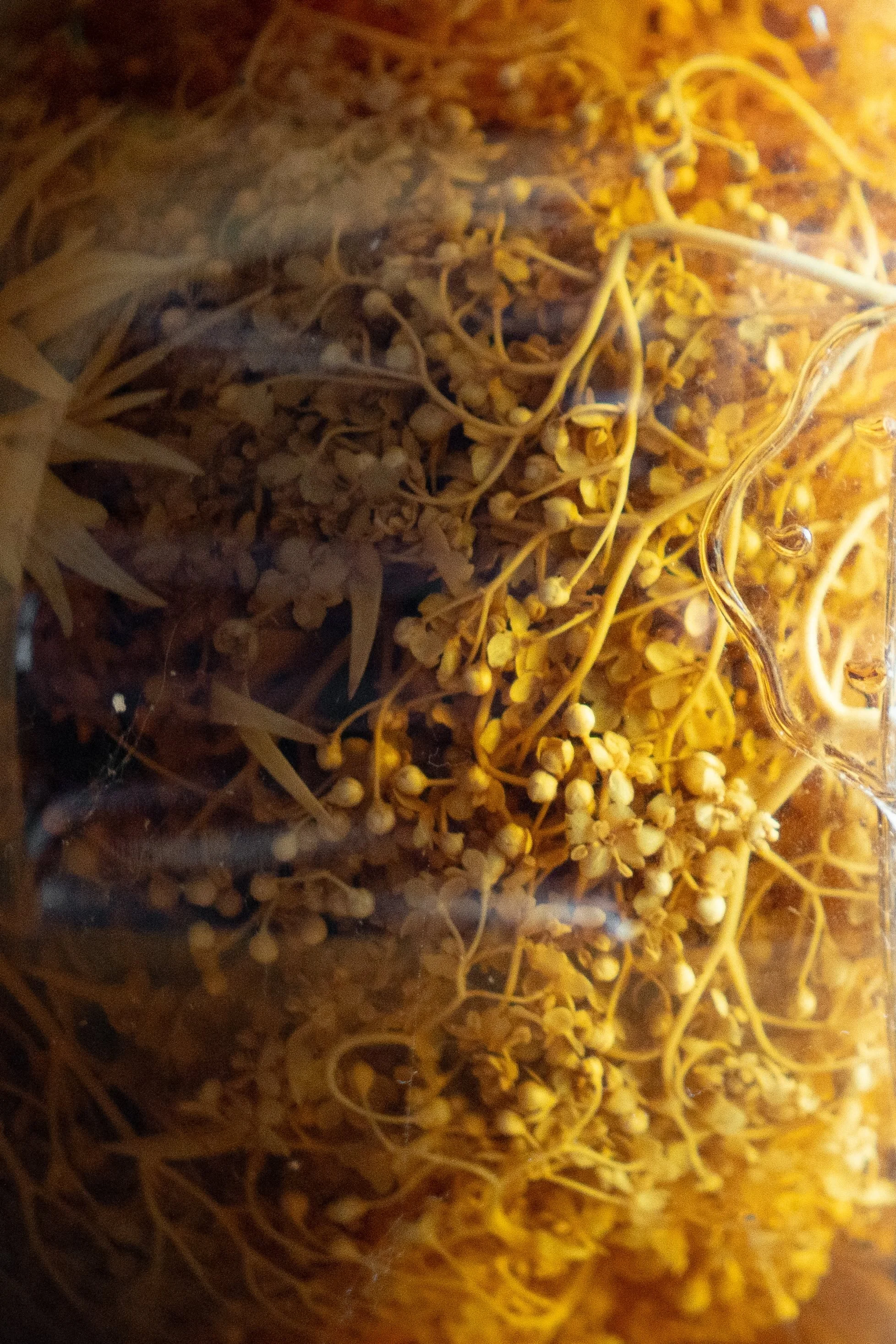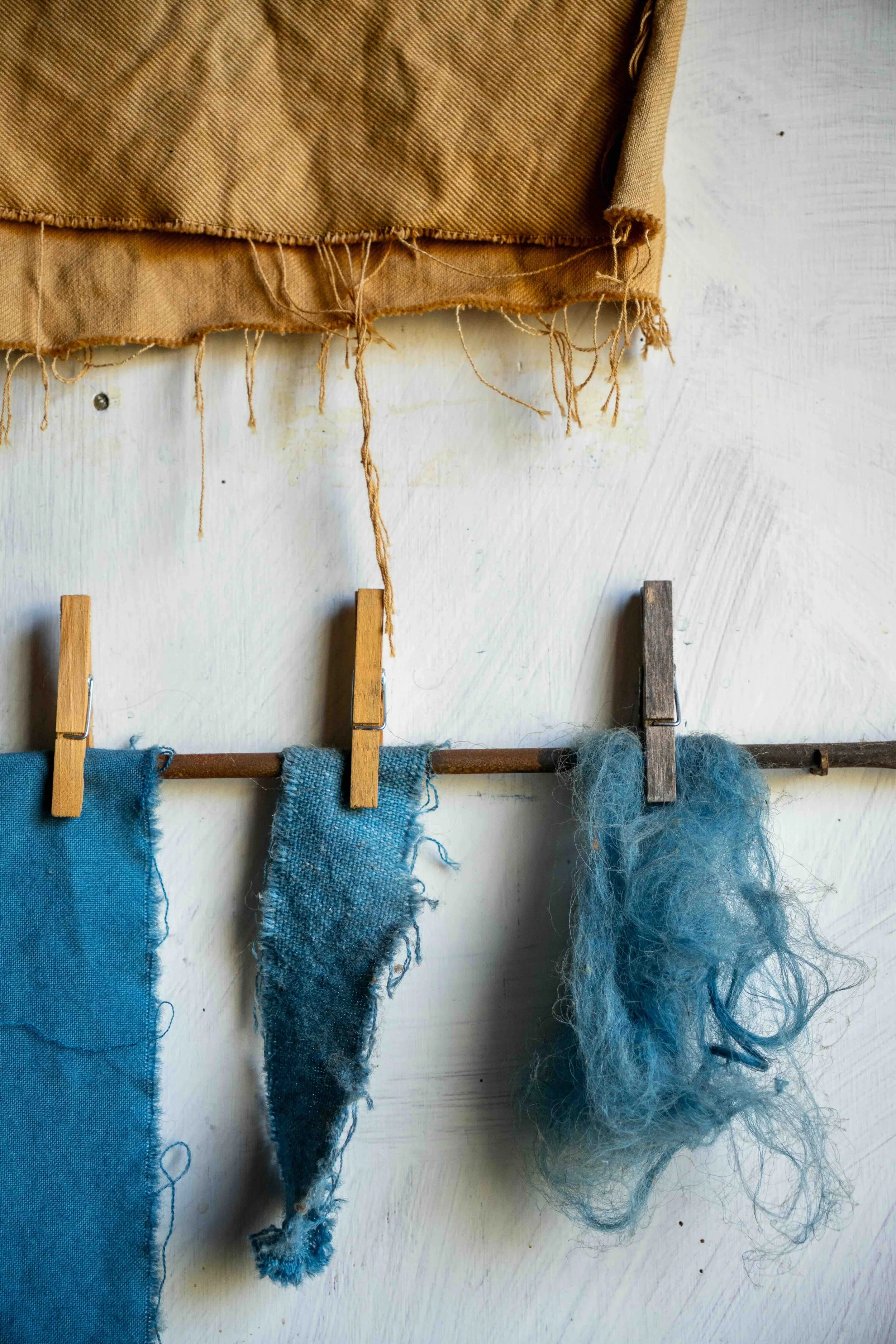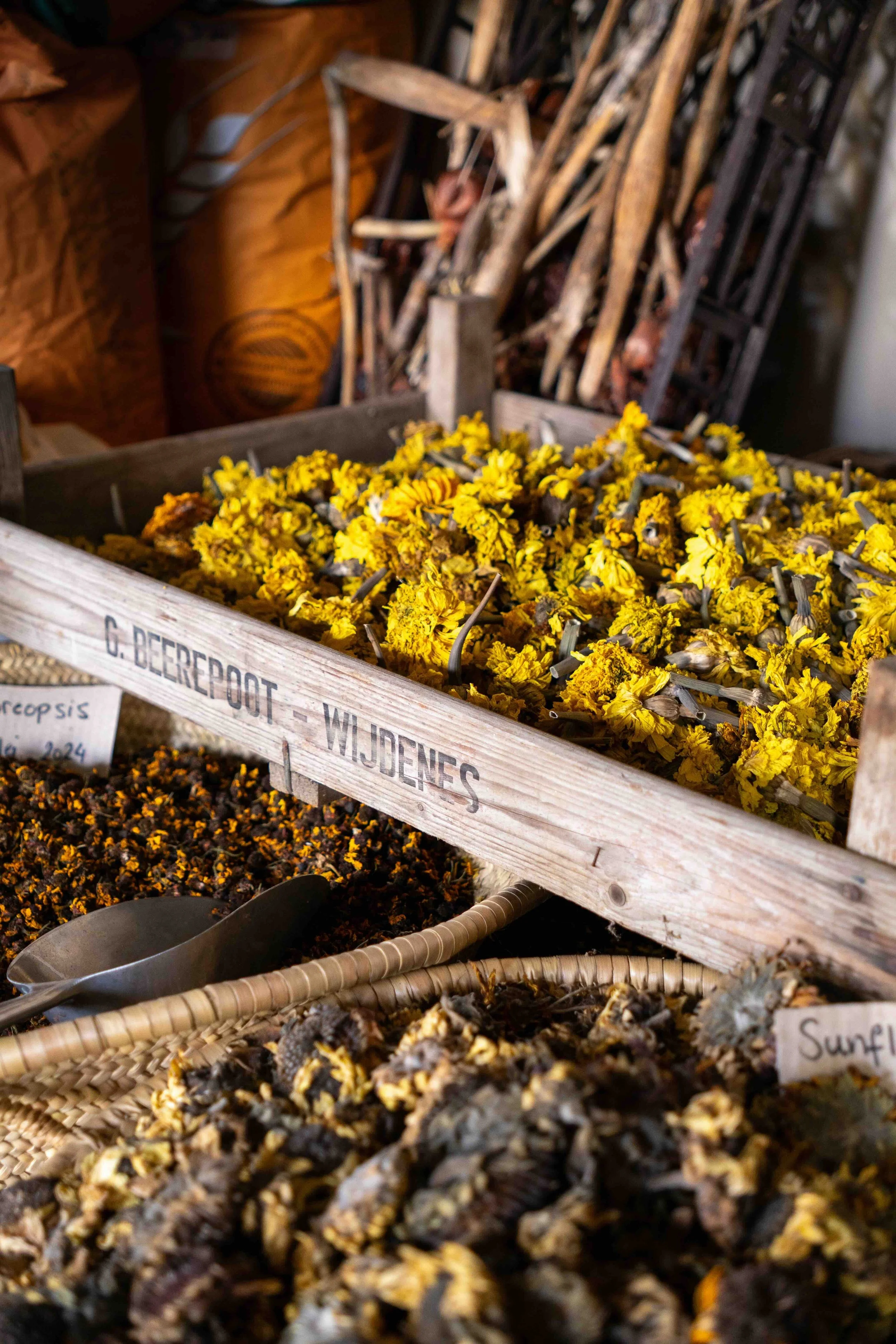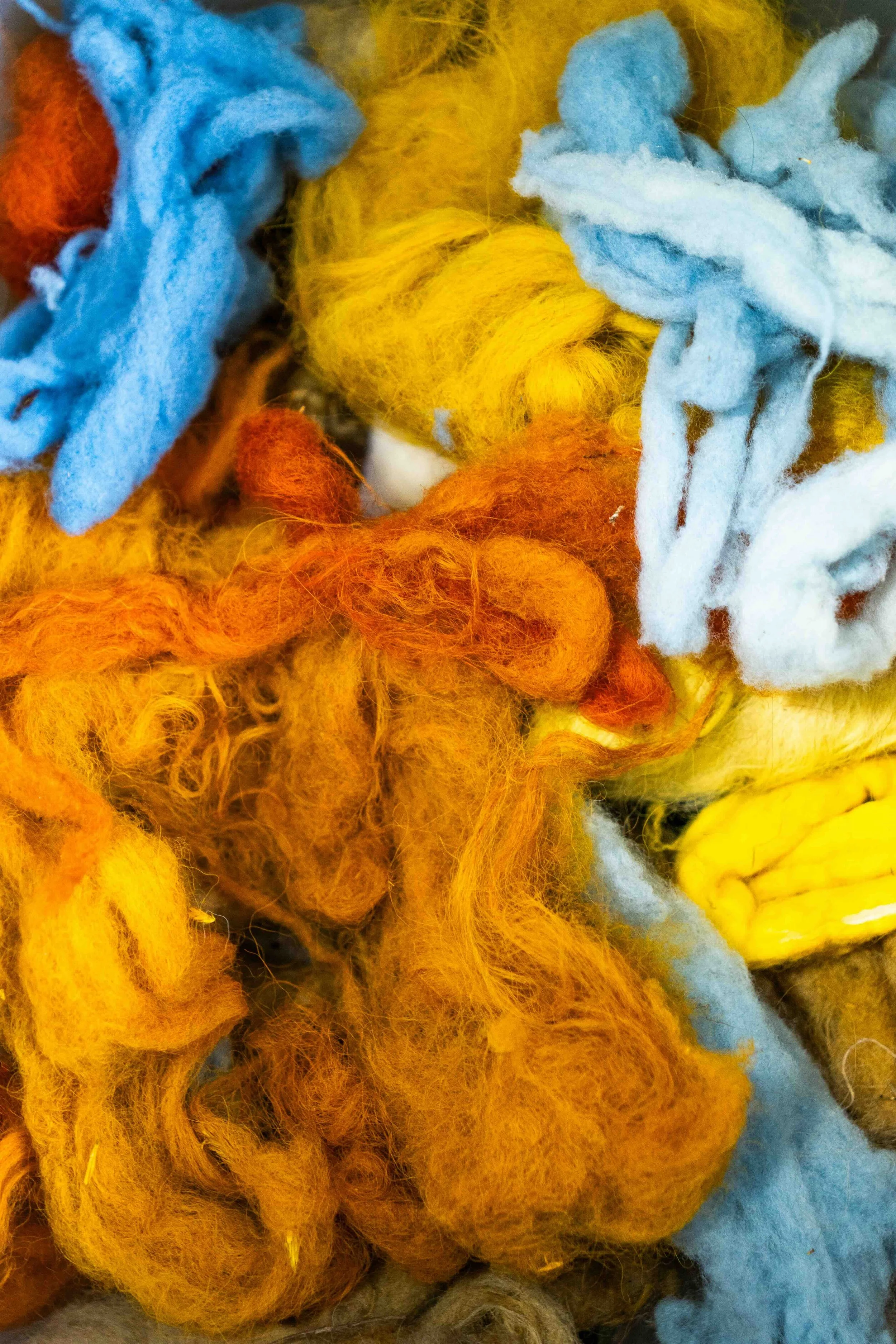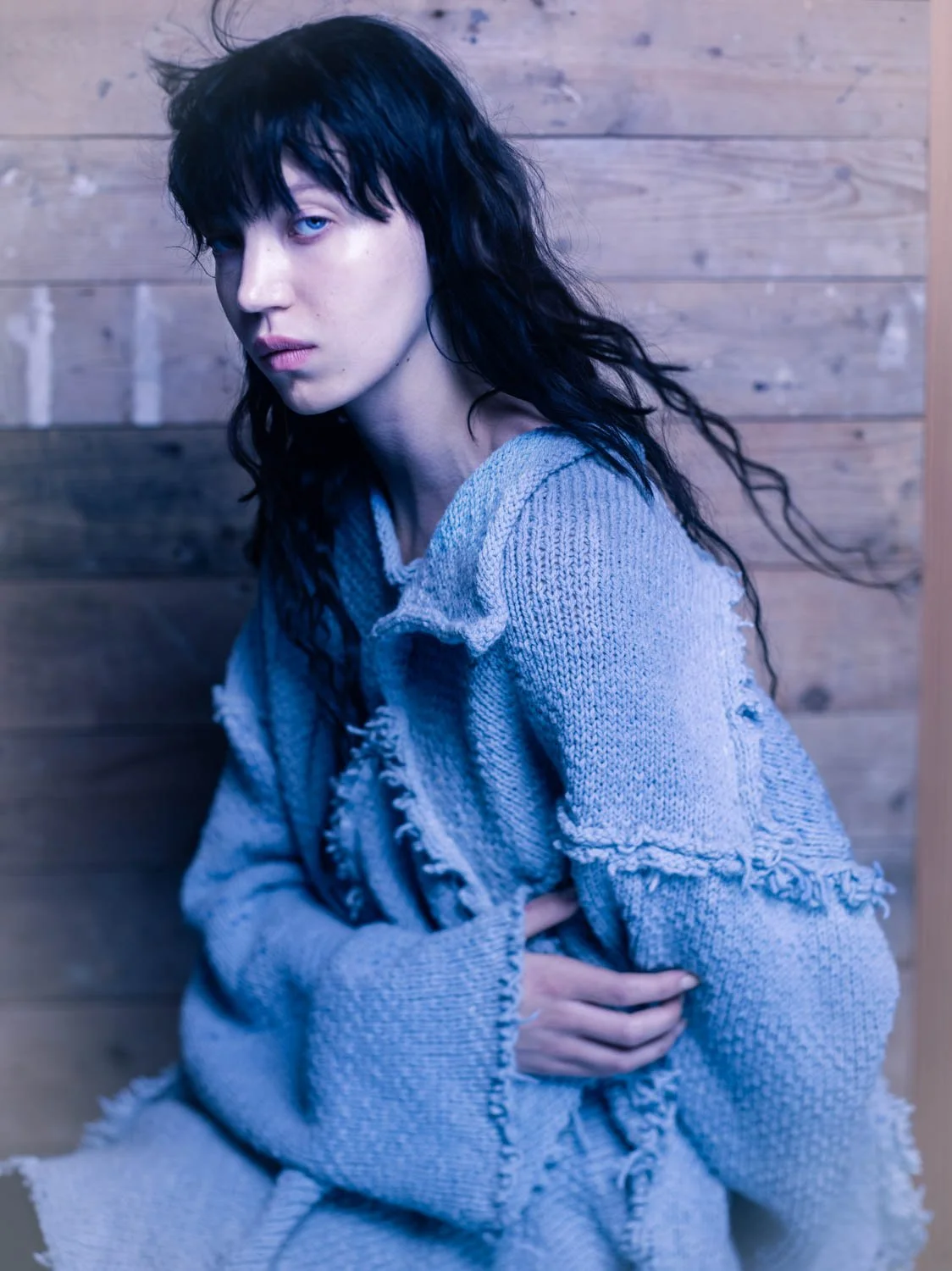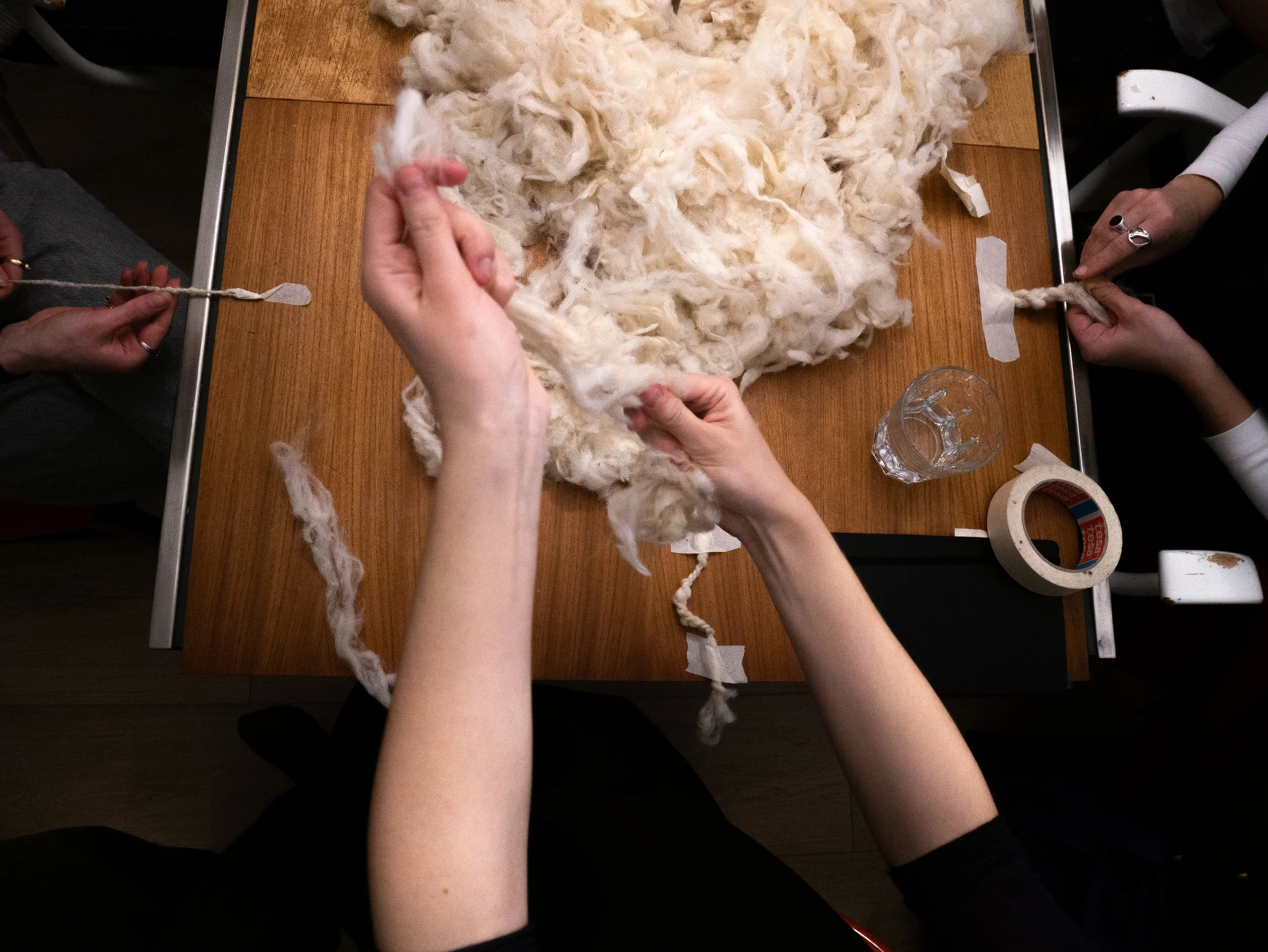
Talk: The Case for Regenerative Wool
Exploring locally sourced wool as both a challenge and opportunity for a regenerative future in fashion and textiles.

Workshop: Broken Community Garment
The Broken Community Garment is a collective repair workshop led by our Repair Crew and De Naaierij. You are invited to gather around woollen clothes and contribute to its repair. Bring in your own woollen clothes to customise or buy one from our pre-loved wool garment rack.

Talk: Wool in History and Culture
On our second day we dive into the historical and cultural significance of wool in fashion and textile design. Together with our program partner Het Textielmuseum, we trace back the timeline of wool: from humanity’s first uses of wool and ancient shepherding, through the years of European wool trade, to its evolving role in modern-day fashion. We will explore iconic wool textiles, techniques and designs that have defined cultures, illustrating how wool went from a cornerstone of civilization to an underrated material today. Expect a talk that will broaden your perspective on the relevance of wool in fashion & textiles design.
Panelists:
Jantiene van Elk (Librarian at Het Textielmuseum)
T.b.a.
Haiko Huvenaars (Host & Moderator)

Activation: Knitters Takeover
We warmly invite knitters to join us in the NOOF Lab for a collective knitting activation. The lab will open at 11:00 with a lecture, and from 12:00 to 18:00 the space will be dedicated to knitting together.
You’re welcome to walk in from 11:00 onward and join at any time that suits you. There’s no need to stay the whole day, the important thing is to bring your creativity and enjoy working with wool alongside others.
This activation is a way to showcase your skills, celebrate the beauty of working with wool, and share the process with the public. We’re excited to highlight your talents and to make this a lively and inspiring day together!
Don’t worry if you are new to knitting. Knitting needles and yarns are available for visitors to join in. Participants from the Regional Wool Project will be working on their projects as well, and will be happy to help you!
Free Event
About your host
The Regional Wool Project began on sheep shearing day in Heeze, where wool was collected from 25 Kempisch Heideschapen—sheep that help maintain the Strabrechtse Heide. Participants received wool from a specific sheep, creating a direct link between animal, material, and maker. Others worked with pre-spun yarn from the same breed.
Over the following months, 25 makers explored techniques like spinning, knitting, crocheting, felting, dying and weaving to transform this local wool into personal projects. These handmade works will be on display during Dutch Design Week this October.

Workshop: Spin Anything Hackathon
Spin Anything is a hackathon-style workshop led by Alice Gielen where participants are challenged to turn anything into a spindle. We start by hacking together spindles from everyday scraps and trying them out. The focus is on experimentation, improvisation and playful invention, celebrating every attempt wonky and/or wonderful.
We’ll also provide plenty of materials, but we encourage you bring along something as well that you think would make a good spinning tool. Think about fidget spinners, spinning toys, pens, pencils and CD’s. We’ll be spinning with local sheep wool. This workshop is open to all, just bring curiosity and a willingness to spin with anything!
Time Slots
12:00-13:30
14:00-15:30
16:00-17:30
Free event
Aline Gielen
Alice Gielen works at the intersection of textile craft, computation, and material innovation. Her practice bridges cultural heritage with digital fabrication, embracing unpredictability and human–machine collaboration to open new spaces for speculation, creativity, and sustainable making.

Talk: From Sheep to System – Agriculture and Wool’s Economy
This day investigates how sheep farming has developed in the Netherlands (and similar contexts), why sheep are kept today, and why wool has become a low-value byproduct. It blends a bit of history with a systemic view: how did we get to a point where raising sheep is mostly for meat or land management, and wool is nearly worthless? We will explore what a regenerative agricultural system could look like and how sheep-farming could fit within that system. Most importantly, we seek to understand the characteristics and challenges of modern-day agriculture.
Speaker line up to be announced soon!

Workshop: Needle Felting Fashion
What if the wool that farmers often discard could become the building block of future textiles? In this hands-on session, Boldwool introduces FeltFabriCk: an innovative process that fuses local wool with up-cycled fabrics into strong, expressive, and repairable materials. The workshop is both tactile and reflective: you’ll engage with wool as fiber, but also as part of an ecosystem where design, farming, and circular economy meet.
Learn how undervalued wool is transformed through enzyme-assisted washing and needle-felting. Together with designer Rebecca Fowden experiment with her felting techniques to create your own small FeltFabriCk samples.
Explore the stories behind the material, from the farm where the wool was sheared, to the design possibilities it unlocks. No prior textile experience required, just curiosity and a willingness to experiment.
Time Slots
12:00-13:30
14:00-15:30
16:00-17:30
Free event
Rebecca Fowden
Rebecca Fowden is an Irish fashion designer with a focus on textiles, specialised in needle-punch felting and knitwear. Her work is inspired by a deep passion for nature and sculptural design. Fowden values slow fashion, sustainable alternatives, and a commitment to up-cycling and recycling whenever possible.
Boldwool — Wool as a System
Boldwool is a regenerative textile initiative founded by Lennart van Bolderick, turning undervalued Dutch wool into new forms of value for design, ecology, and local economies. Through its innovation FeltFabriCk, a hybrid material made by needle-felting coarse, local wool onto recycled base fabrics, Boldwool creates durable textiles for footwear, outerwear, and interiors. Each product is traceable to its origin and designed for repair, ensuring fair returns for farmers and low environmental impact.
Boldwool is not just about products, but about building an ecosystem: reconnecting sheep, soil, and society, and proving that wool is not waste, but a regenerative ally for the future
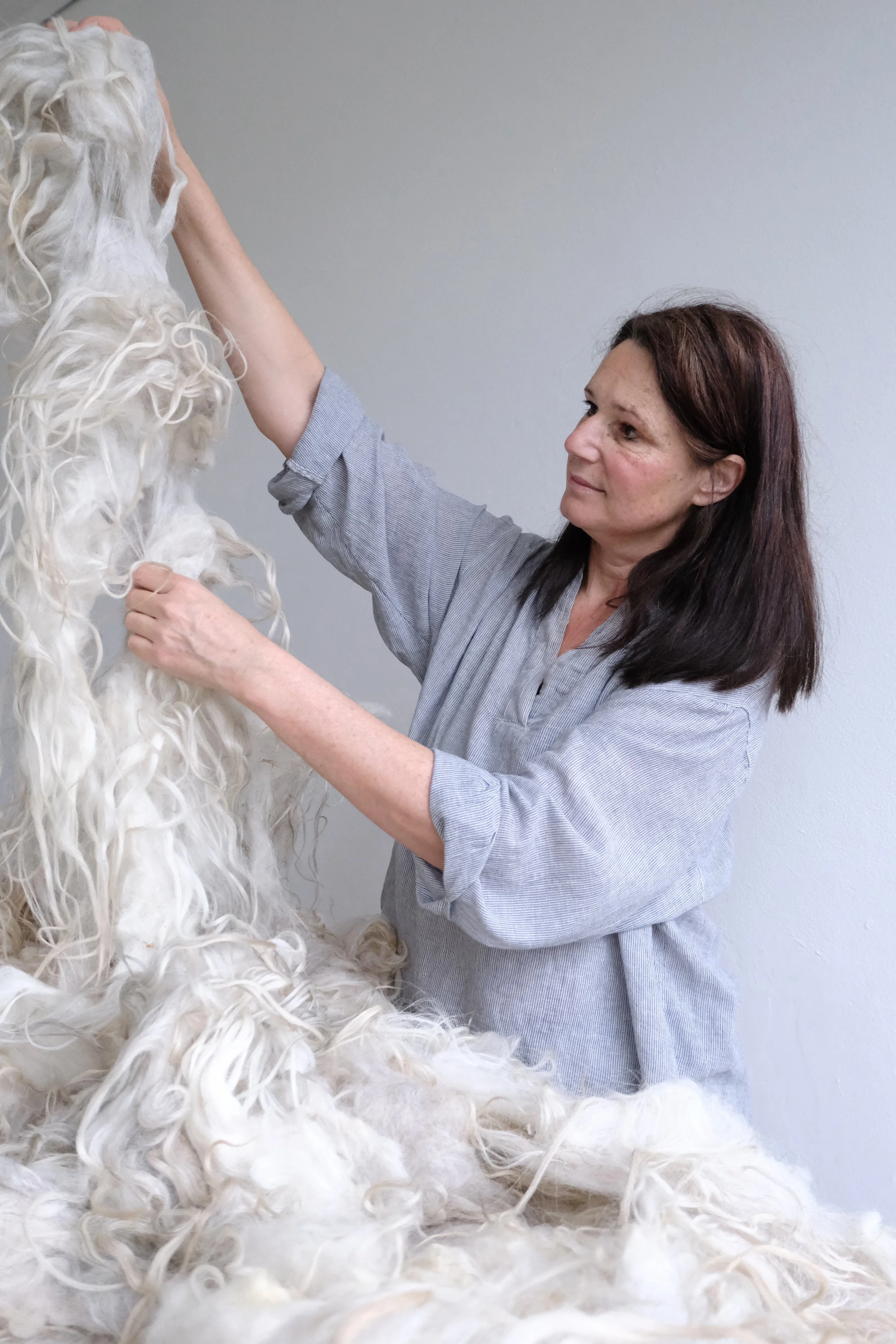
Workshop: All About Local Wool
What to do with all our wool? In The Netherlands we ‘produce’ every year about 1,5 million kilo’s of wool without a purpose, nearly all of this wool get destroyed. In the meantime we produce millions of synthetics for our clothes and we import wool from the other side of the world. Why is this and what can we do to turn this non sustainable practice? First step is to learn about the value of our own local wool, and how can we do better as to feel the wool in our hands and create. This is exactly what we’re going to do in this short but meaningful wet felting masterclass led by renowned wool artist Beatrice Waanders.
Time Slot
11:00-13:30
Paid workshop
Beatrice Waanders
Beatrice Waanders studied at WDKA academy in Rotterdam and is since 17 years active as an international renowned wool- artist and ambassador. From the beginning she’s one of the pioneers of revaluating local wool and of a radical biocircular and carbonfree crafts practice.
Beatrice works with architects and interiordesigners worldwide. Her work was exhibited at fairs as Salone di Mobile Milan, Maison and Objet Paris and Art Basel Miami Suisse and published by Lidewij Edelkoort. She worked for brands like LVMH and Maison Margiela. With designer John Galliano she designed a coat for singer Rihanna. For Dutch artist Joep van Lieshout she made tapestries to decorate two of his artworks.

Talk: Networks and System Change (in Fashion)
Understanding what “system change” means in fashion, why isolated initiatives aren’t enough, and how collaboration across the value chain can trigger profound shifts. We will draw lessons from existing networks (like the NewTexeco network) and toolkit projects aimed at circularity, and examine how system thinking can help wool and other sustainable materials gain a foothold.
Speaker line up to be announced soon!

Talk: Human–Animal Relationships – Rethinking Sheep and Ethical Fashion
A critical and philosophical exploration of our relationship with animals in the context of fashion, using sheep and wool as the focal point. This session examines ethical, philosophical, and even spiritual perspectives on how humans treat animals (like sheep) as resources. It challenges the audience to reflect on concepts of commodification of living beings, welfare standards, and whether truly “humane” animal products are possible. The goal is a critical reflection on modern society’s stance toward animals in production systems, leading to questions about respect, coexistence, and responsibility.
Speaker line up to be announced soon!
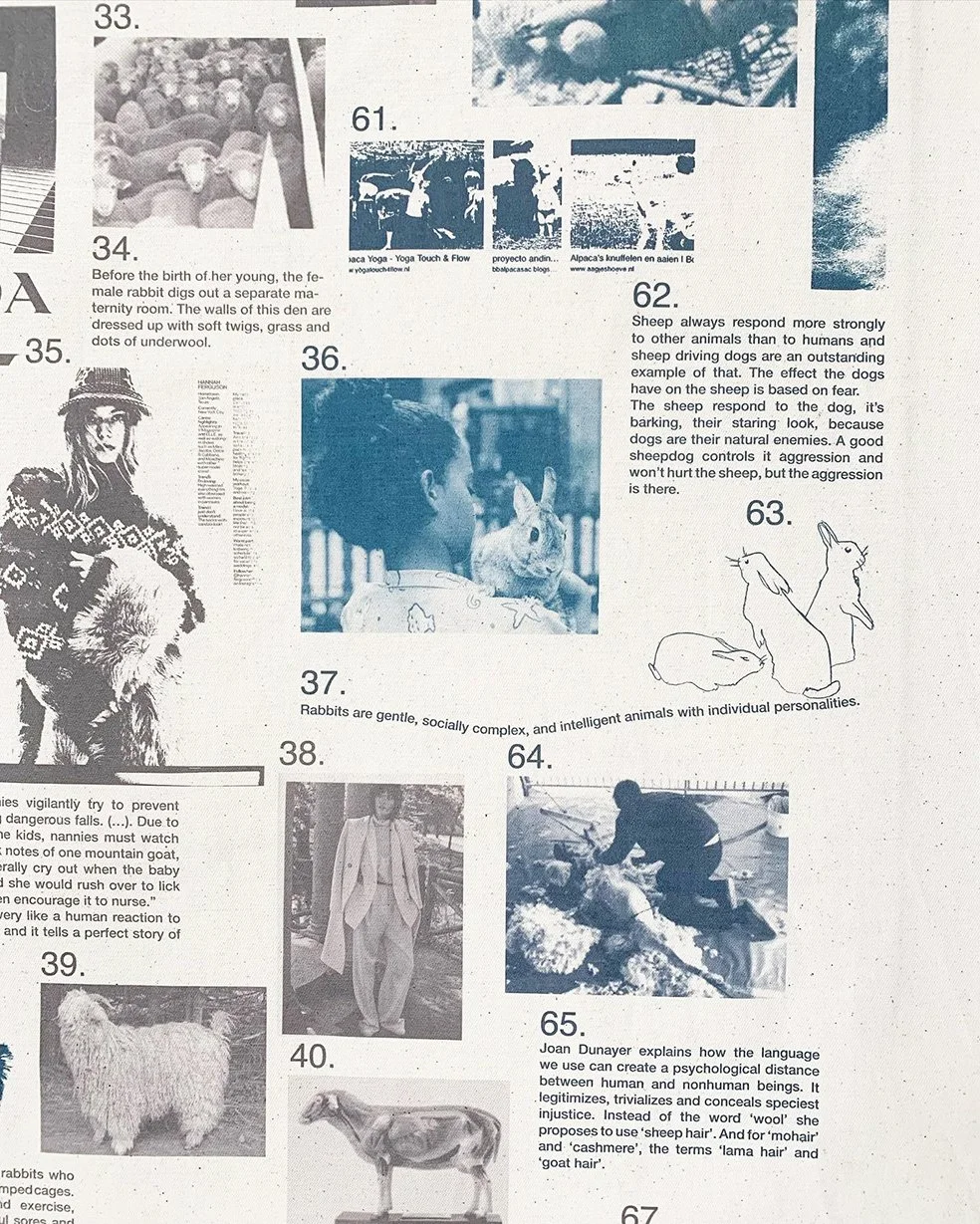
Activation: Which Animal is Present in Your Garment?
In Which Animal is Present in Your Garment? we explore human - nonhuman animal relations in fashion by looking at the clothes we wear.
Daily we ‘encounter’ a broad range of nonhuman animals through the materiality of our clothes (leather, wool, fur, silk, feathers) and through representations in fashion media. While the fashion industry harbours extensive human – nonhuman animal relations, the actual lives or animals are hidden. Absent in the fashion discourse, this activity aims to invite a more critical and considerate attitude towards our relations with nonhuman animals.
Which Animal is Present in Your Garment? usually takes the shape of a cloakroom intervention but for New Order of Fashion it’s translated into a short activity in which you are invited to analyse your own garment and answer a few questions about it.
Time Slots
12:00-13:30
14:00-15:30
16:00-17:30
Free event
Femke de Vries
The workshop is guided by Femke de Vries. Femke works as a researcher, writer, artist and teacher. Her work is centered around the cultural, social and political role of dress and fashion. She’s interested in the power structures of the commercial fashion industry and the exploration of alternatives. Her most recent works revolve around the relation between human and nonhuman animals in fashion; the existing relations that are present but overlooked, and the proposition of new ones.

Talk: Changing the Industry – Certifications, Standards, Policy, and New Business Models
Moving into solutions mode, this day addresses how the fashion/textile industry can be steered toward sustainability through policy, certification standards, and innovative business models. It builds on the prior discussions (the problems and ethics) and asks: what concrete mechanisms are in place, or need to be created, to change industry practices at scale? We will explore the role of government legislation, international standards (like those from Textile Exchange or others), and how companies can implement new models that prioritize sustainability and regeneration.
Speaker line up to be announced soon!

Workshop: Needle Felting Fashion
What if the wool that farmers often discard could become the building block of future textiles? In this hands-on session, Boldwool introduces FeltFabriCk: an innovative process that fuses local wool with up-cycled fabrics into strong, expressive, and repairable materials. The workshop is both tactile and reflective: you’ll engage with wool as fiber, but also as part of an ecosystem where design, farming, and circular economy meet.
Learn how undervalued wool is transformed through enzyme-assisted washing and needle-felting. Together with students from ArtEZ from Collectie Arnhem 2025 experiment with layering and felting techniques to create your own small FeltFabriCk samples.
Explore the stories behind the material, from the farm where the wool was sheared, to the design possibilities it unlocks. No prior textile experience required, just curiosity and a willingness to experiment.
Time Slots
12:00-13:30
14:00-15:30
16:00-17:30
Free event
Collectie Arnhem TWENTYFIVE
How can we design fashion collectively? Collectie Arnhem TWENTYFIVE answers this through treating collaboration not only as a method, but as a material in itself. This collaborative collection by 16 third-year students began with the word ‘craftsmanship’, a term unravelled and reshaped into an experimental, creative energy. A concept where care, decay, and time meet. Drawing inspiration from the imagined afterlife of a forgotten wardrobe, where garments materialise the erosion of memory: coats and hats made of Dutch raw wool are transformed using wet felting and ombré dyeing, mimicking the slow fade of fabric left to age and warped by imagined decades of wear. Each piece bears the marks of many hands, stitched, sculpted, and shaped through equal contribution. In doing so, Collectie Arnhem TWENTYFIVE proposes a fashion practice rooted in shared authorship, where creative synergy becomes both the design language and the message.
Boldwool — Wool as a System
Boldwool is a regenerative textile initiative founded by Lennart van Bolderick, turning undervalued Dutch wool into new forms of value for design, ecology, and local economies. Through its innovation FeltFabriCk, a hybrid material made by needle-felting coarse, local wool onto recycled base fabrics, Boldwool creates durable textiles for footwear, outerwear, and interiors. Each product is traceable to its origin and designed for repair, ensuring fair returns for farmers and low environmental impact.
Boldwool is not just about products, but about building an ecosystem: reconnecting sheep, soil, and society, and proving that wool is not waste, but a regenerative ally for the future

Workshop: Saar Snoek Snor
Learn from Saar Snoek, a professional hat maker, how to create a small, wearable accessory using a “no-kill” alpaca fur technique. Join Saar on a journey into fur making and styling, and she shares her relationship with alpacas, from sourcing to selecting highest quality pieces from each fleece. Playfully apply the fundamentals of the wet felting technique for crafting fur-like textures. And finally get some handy aftercare techniques for detangling, brushing, trimming, shaping, and styling your new stylish hairy accessory.
Time Slots
12:00-14:00
15:00-17:00
Paid Workshop
Saar Snoek
Saar Snoek works as a hat maker and felt maker in Groningen. She combines traditional millinery techniques with innovative felt-making methods, letting the properties of the material take the lead. Her organic, wearable objects have received international recognition, won awards, and been included in museum collections. In addition, she teaches international masterclasses in sculptural felt making.

Talk: Regenerative Pioneers – New Paths for Wool and Fashion
Inspiring case studies of pioneers who are practicing regenerative and circular approaches beyond the conventional paths. This talk shines a spotlight on three innovative initiatives – Claudy and Jesk Jongstra’s “LOADS” collection and two other regenerative pioneers – as examples of what is possible when one fundamentally rethinks how we produce and design textiles. These are the trailblazers operating largely outside mainstream industry, demonstrating “how it can be done differently.”
Speaker line up to be announced soon!
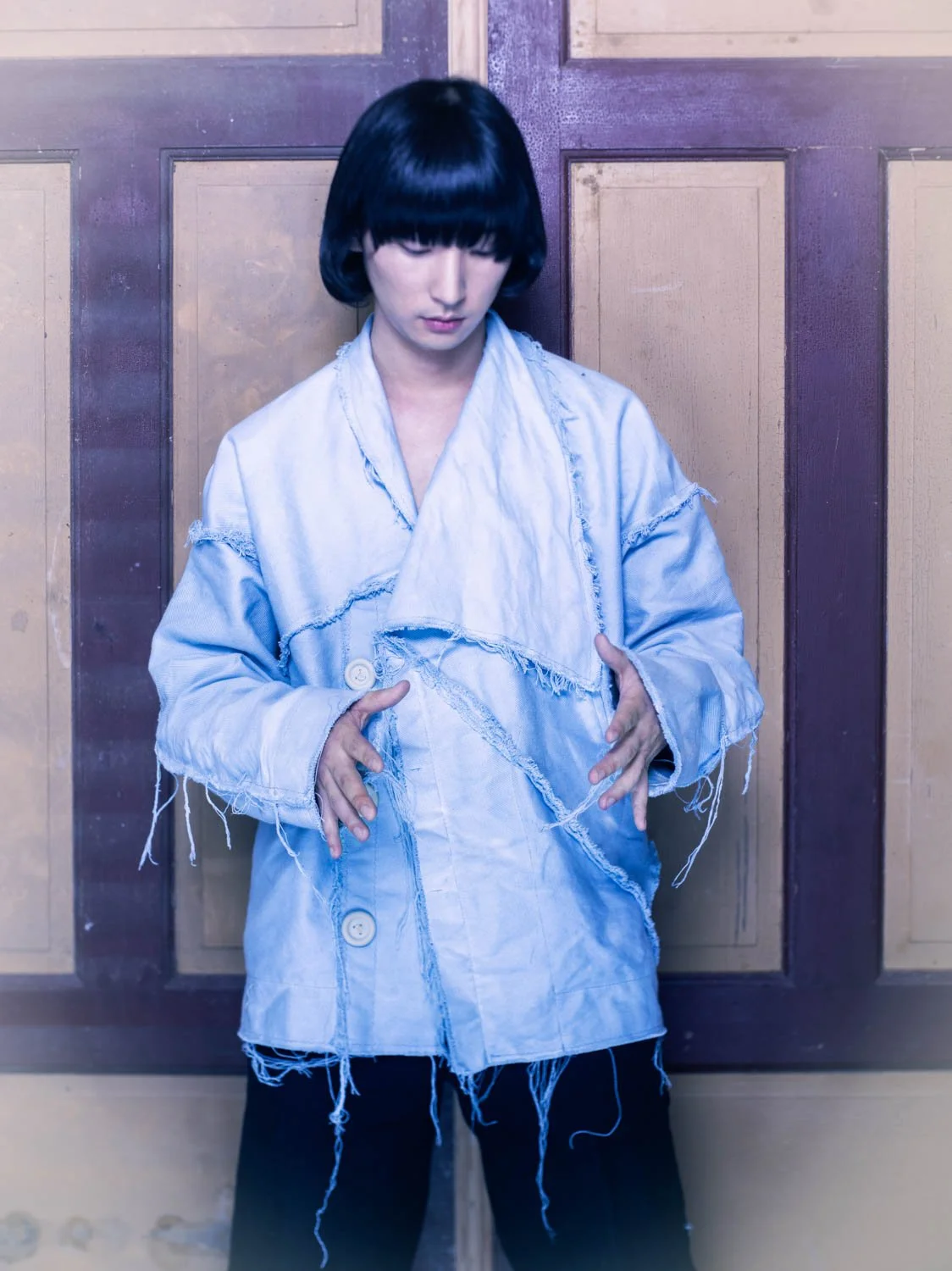
Workshop: LOADS - Pop Up Dye Station
Step into the world of natural colour. In this workshop, we immerse wool in baths full of plant-based pigments, from the warm tones of onion skins to the deep blues of indigo. You’ll witness fibers slowly transform, breathe in the herbal scents, and feel the softness of the wool in your hands. Together, we explore how textiles can take on colour without chemicals, honouring both nature and craft. A moment to slow down, to experiment, and to lose yourself in the magic of plant-based dyeing.
Time slots
12:00-12:30
12:45-13:15
13:30-14:00
14:15-14:45
15:00-15:30
15:45-16:15
16:30-17:00
17:15-17:45
LOADS Collection
As the world's first Demeter-certified biodynamic textile label, LOADS Collection is on a mission to create luxurious textiles through mindful ecological stewardship and ethical collaboration, without depleting resources or exploiting people.
LOADS Collection works exclusively with 100 % natural fibers and plant-based dyes – no synthetics, no chemical treatments. Their mono-material textiles avoid microplastics found in recycled blends, prioritising health and biodegradability. Through regenerative cultivation, the plants used for colour not only provide rich pigments, but also help restore soils and foster biodiversity. The result is a collection of high-quality interior and wearable designs that reflect both material integrity and visual impact.
photography by Marcel van der Vlugt

Talk: Understanding talent development & creative hub infrastructure
A look at the importance of creative infrastructure and talent development in driving the future of sustainable fashion. This day is two-fold: first, a panel on the ecosystem that nurtures young designers (using New Order of Fashion’s lab and the Lottozero Textile Laboratories as key examples), and second, an afternoon dedicated to “talent spotlights” – showcasing emerging designers’ work and perspectives. The main idea is to reflect on why institutions like ours (New Order of Fashion) and our partners exist, what roles they play in a larger network, and how investing in talent and creativity pays off for industry transformation.
Speaker line up to be announced soon!
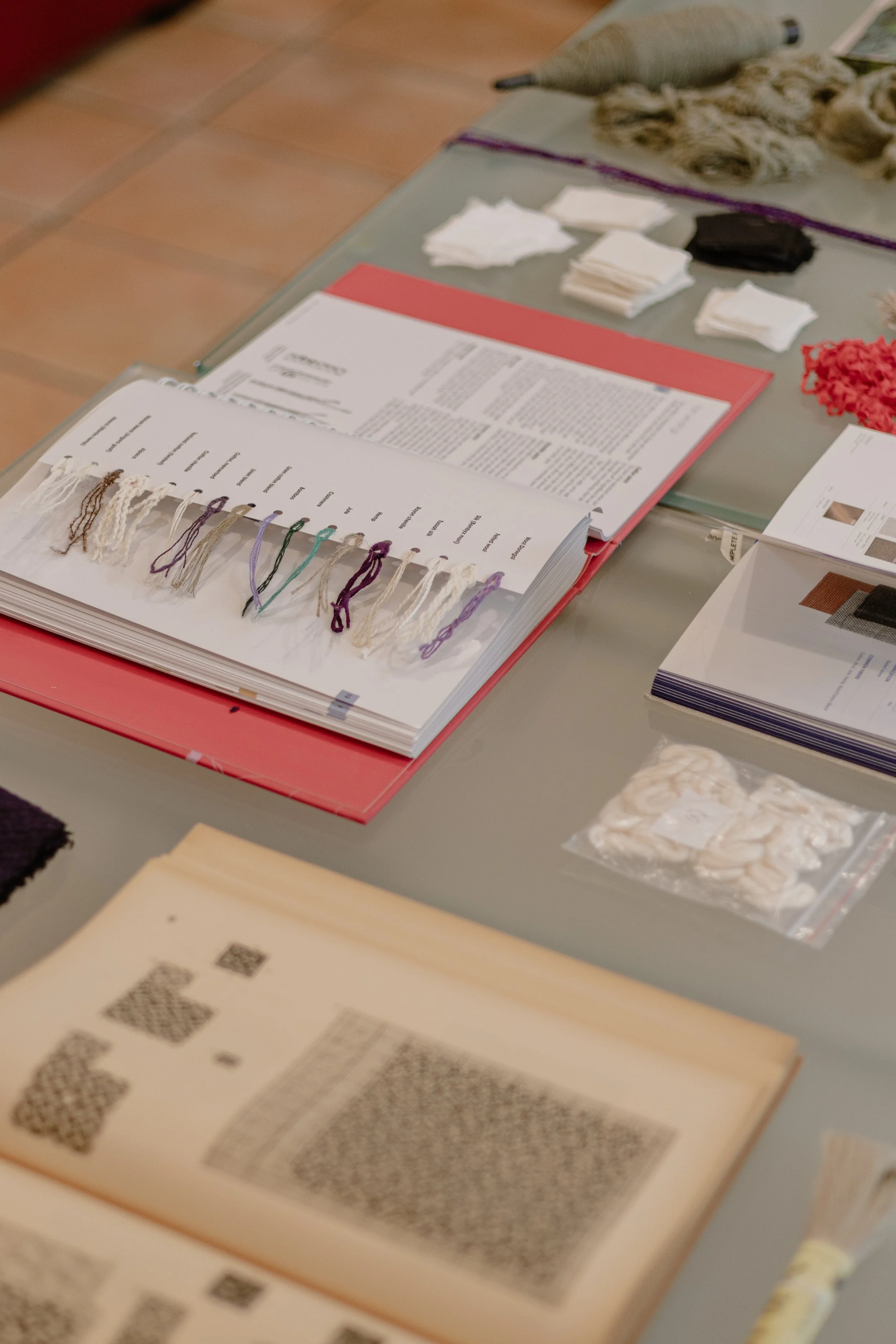
Workshop: Made in Prato: A Textile Literacy Workshop for Designers
This hands-on textile culture workshop invites participants to explore, handle, and reflect on a curated selection of recycled fibres, yarns, and textiles sourced directly from Prato, a global hub for wool recycling and circular textile practices.
During the session, participants will have the opportunity to closely examine these materials, discuss their characteristics collectively, and engage in tactile learning. Together, we will analyse fibre types, yarn structures, and fabric qualities, using both guided insights and open exchange.
Each participant will create their own material datasheets and assemble a small personal textile archive to take home—reflecting the same materials preserved at NOOF. This process not only fosters individual learning but also builds a shared connection to the broader culture of textile reuse and sustainability. The workshop is designed as an open and collaborative space, welcoming diverse questions, experiences, and perspectives. Whether you're a maker, designer, researcher, or simply curious, your input is valuable—come ready to explore, learn, and contribute.
Time Slots
12:00-13:30
14:00-15:30
16:00-17:30
Free event
Lottozero
Lottozero is a textile innovation center in Prato, Italy, a city known for its strong textile industry. It is both a laboratory and a cultural space, where designers and artists can experiment with weaving, printing, dyeing, and other textile techniques. The space also hosts exhibitions, residencies, and workshops, creating opportunities for collaboration between local industry and international creatives. Lottozero aims to connect traditional craftsmanship with new design approaches, with a focus on sustainability and cultural exchange.

Talk: NOOF Talent Talks
Understanding the perspectives, works and visions of emerging design talent. We will invite three talents to the stage to share their stories and learn how we can support them better. Based on photos of their making process they take us along their process of making and learn from their visions for a better industry.
Speaker line up to be announced soon!

Talk: NOOF Talent Spotlight
Showcase 2 - 3 projects our (former) talents are now involved in to understand how impact is made beyond the design table. Often we see talents developing themselves beyond just the practice of design. They get involved with all sorts of social initiatives that are aiming to make the world a bit better through design and fashion. We will invite Anabel Poh (Kantamanto Social Club) and x to our stage to share their stories, experiences, hopes and dreams.

Talk: Closing Reflections – Where Do We Go From Here?
A wrap-up and collective reflection on the entire program. This final day is about synthesizing insights from the week’s talks, sharing experiences, and engaging the audience in dialogue about next steps. It’s less about presenting new content and more about making sense of it together: what have we learned about wool, sustainability, and regeneration? And crucially, what questions or actions do we carry forward beyond Dutch Design Week?
Speaker line up to be announced soon!

Workshop: Unum - Twined and Twisting
Take a moment to unwind at the end of a busy week of design with a mindfulness workshop. Unum is a workshop which centres wool twining as a medium for connection, reflecting on the history and value of communal work. During the workshop, participants are invited to explore the relationship between body and mind, self and others, past and present, through this ancestral way of working. Over the session you will work hands-on with wool collected from the Kempische Heideschapen which will be integrated into a collective tapestry.
Time Slots
12:00-13:30
14:00-15:30
16:00-17:30
Free event
Julia Egermann
Julia Egermann is an artist and designer, currently in her fourth year at the Design Academy Eindhoven. Her work is driven by her interest in who people are, as individuals and societies, in space and in time. Through her projects, Julia seeks to translate her own questioning into shared experiences, provoking others to consider their own identities. Driven by concept, resulting in a variety of material approaches, her work aspires to initiate and facilitate honest, if sometimes difficult, conversations.




